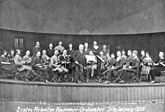Barnet light

Barnet Licht (born May 15, 1874 in Wilna , † May 3, 1951 in Leipzig ) was a German conductor and choir director.
Life
Born in Vilnius, Barnet Licht spent his childhood in New York with his parents after moving to the United States . Since he did not accept the parental wish to become a rabbi , he decided early on to organize his life himself. At the age of fifteen he began doing various auxiliary activities and got to know the social problems of the population. But his great interest was in music. He took private piano and organ lessons, sang in choirs and founded his own choir in 1893. In 1894 he got a job as organist of the Congregation Ansche Chesed, a German-speaking synagogue .
After four years he gave up the job to study music in Germany. In autumn 1898 he enrolled at the Royal Conservatory of Music in Leipzig . He studied music theory / composition, piano, viola, organ and singing with Salomon Jadassohn and Carl Reinecke, among others . He heard musicological lectures at the university with Hugo Riemann and Hermann Kretzschmar . In 1902 he passed his exam.
Barnet Licht on May 1, 1946 on Karl-Marx-Platz in Leipzig
As early as 1901 he became the conductor of the male choir Rütli from the Leipzig working class district of Plagwitz . In the following years he took over other workers' choirs from Leipzig and the surrounding area, which he merged into the Lichtschen Choirs for larger tasks. It came after the First World War to the performance of Handel - Oratorio as Acis and Galatea , Hercules and Saul .
From 1911 to 1928, Licht was head of the music department at the Leipzig Workers' Education Institute. He organized concerts and rehearsals for workers and founded a workers orchestra in 1923. He also included the musical education of offenders in prison in his work and supervised Leipzig prison choirs.
From the beginning of his stay in Leipzig, Licht had close contacts with the Israelite religious community. In 1924 he took over the direction of the choir of the large community synagogue in Gottschedstrasse.
After the National Socialists came to power in 1933, the Licht choirs were banned, and Licht's activities were limited to the Jewish community and Jewish organizations as well as giving private lessons. From December 31, 1939, Licht and his wife Gertrud, b. Lötzsch (1893–1964), whom he married in 1920 and who converted to the Jewish religion in 1933 , live in various “ Jewish houses ”. On February 14, 1945 they were deported to the Theresienstadt ghetto , where they also celebrated their silver wedding anniversary.

On July 21, 1945, Licht was able to return to Leipzig. It soon resumed its activities, and in February 1946 the Lichtsche Choir Association gave its first concert after the Second World War . In 1946 he became a member of the SED and ran for the city council. In the same year he was awarded the title of professor. In 1947, while Licht was still alive, a square in Leipzig was named after him in his honor.
Health problems forced him to give up the direction of his choirs in January 1950. A good year later - barely two weeks before his 77th birthday - he died. His grave is in the New Israelite Cemetery in Leipzig.
literature
- Thomas Schinköth: Music as a way of life: Barnet light. Kamprad, Altenburg 2000, ISBN 3-930550-14-8 .
- Horst Riedel: Stadtlexikon Leipzig from A to Z . Pro Leipzig, Leipzig 2005, ISBN 3-936508-03-8 , p. 354.
Web links
- Barnet Licht in the Lexicon of Persecuted Musicians from the Nazi Era (LexM) (accessed March 7, 2015)
- Jews in Saxony (accessed March 7, 2015)
Individual evidence
- ↑ Gina Klank, Gernot Griebsch: Lexicon of Leipzig street names . Verlag im Wissenschaftszentrum, Leipzig 1995, ISBN 3-930433-09-5 , p. 32.
| personal data | |
|---|---|
| SURNAME | Light, Barnet |
| BRIEF DESCRIPTION | German conductor and choir director |
| DATE OF BIRTH | May 15, 1874 |
| PLACE OF BIRTH | Vilna |
| DATE OF DEATH | May 3, 1951 |
| Place of death | Leipzig |


